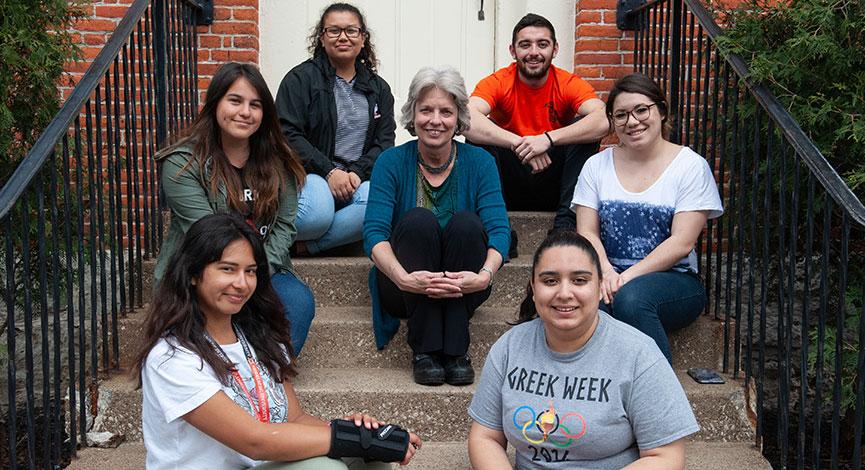
A small act can make a huge difference. A group of seven Heidelberg students and their Spanish professor, Dr. Cynthia Lepeley, will learn just how big when they travel to south Texas in May to volunteer as interpreters at an immigration detention center.
The students – Esmeralda Salazar, Aline Rojas, Bianca Torres, Alexis Mendoza, Samantha Escalera, Evelyn Gonzalez and Ellen Gonzalez Jacquez -- will spend a week at a Dilley, Texas, detention center, working with the Cara Pro Bono organization. They are enrolled in an independent study class to get ready.
According to Cindy, Cara Pro Bono provides attorneys who assist women and children with preparing for their “credible fear” interviews, the first step in the process as the women seek asylum in the U.S.
“Not all of the attorneys speak Spanish, so we are going to volunteer to interpret for them,” she explains.
The students – all of whom are native Spanish speakers – will work alongside the attorneys 12 hours a day for a week as they try to determine why the women are seeking asylum. They’ll inquire about the situation that caused them to flee from their homes and why they believe it’s unsafe to return.
Most of the detainees have fled from violence in Central American countries. “If their story is deemed not strong enough (for immigration), the women will go into deportation proceedings,” Cindy says.
The students realize the magnitude of their work. “If we can make a difference and save a life, that would mean a lot to the women and their children,” says Alexis, a senior from El Paso, Texas. He added that the class has spent a great deal of time practicing interpreting skills, studying language nuances they may encounter, and learning interpreting protocols and professionalism.
They have the perfect mentor for the job. “Profe,” their professor, has a wealth of experience with legal and medical interpreting. However, interpreting for immigration is something new for all of them.
Samantha, a junior from El Paso, Texas, explains that the class also has studied immigration and legal terminology, both in English and Spanish. They’ll need this knowledge on the job. Several of the students have practiced by doing telephone interpreting for Cara Pro Bono already, so some of the situations won’t come as a complete shock to them.
There won’t be much time to unwind after very intense and stressful days. “We know we’re going to be dealing with a lot of emotions. We will have to empathize but we need to also block those (emotions) out,” Alexis says. Esmeralda, a sophomore from Port Hueneme, California, adds, “We know these are life or death situations, so there won’t be time to mess around.”
For Aline, a sophomore from Oxnard, California, this project is personal. “I know what my parents went through and why they came to this country,” she says. “I just want to do something to help.”
Despite all of the preparations, the students know the experience will be eye-opening. “It’s hard to empathize, not knowing their stories,” Samantha says. “But speaking to people who have lived different experiences … I think it will be very humbling.”
The students will not know the outcomes of the interviews in which they participate, but that’s just part of the process. “We are not going to know the next step for the immigrants,” Cindy explained. “So we’ll just do what we can.”
Regardless of the outcomes, she’s “really proud” of this group of students and knows the experience will be profound and meaningful for all of them.